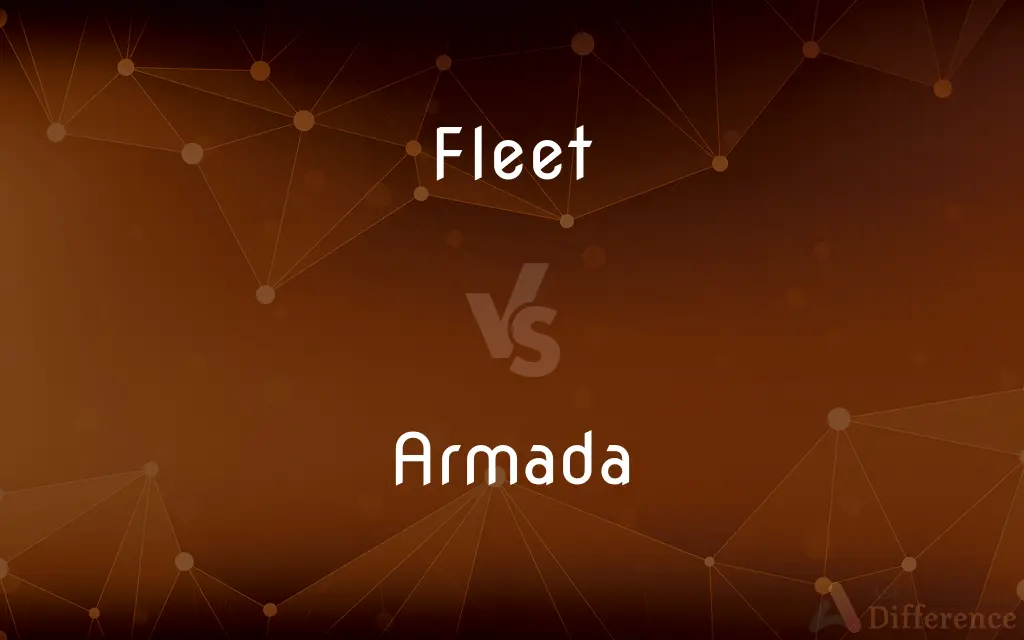Fleet vs. Armada — What's the Difference?
By Urooj Arif & Maham Liaqat — Updated on March 16, 2024
Fleet and armada both refer to groups of ships, but a fleet is a general term for any group of ships, while an armada specifically denotes a large fleet of warships.

Difference Between Fleet and Armada
Table of Contents
ADVERTISEMENT
Key Differences
A fleet can be any collection of ships, regardless of size or purpose, including commercial, fishing, or naval vessels. An armada, on the other hand, is typically used to describe a large and impressive fleet of warships, often organized for military action.
While the term fleet is versatile and can apply to various contexts, from merchant fleets to naval fleets, armada carries historical and military connotations, often associated with significant naval forces in history.
Fleets serve a wide range of purposes, including transportation, commerce, and defense, and can vary greatly in size. Armadas are primarily focused on naval power and military presence, usually assembled for major operations or conflicts.
The use of fleet is common in both civilian and military naval contexts, reflecting a broad application in maritime operations. Armada, however, is more specific and is often used to evoke a sense of grandeur and formidable strength in a naval context.
Comparison Chart
Definition
A group of ships, irrespective of size or purpose
A large fleet of warships, typically for military action
ADVERTISEMENT
Usage Context
Broad, including commercial, naval, and personal vessels
Primarily military, with historical and grand connotations
Size and Purpose
Can vary widely, serving commercial, transportation, or defense purposes
Large in size, focused on naval power and military operations
Connotation
Neutral, versatile in application
Impressive, often associated with significant historical naval forces
Examples
Merchant fleet, fishing fleet, naval fleet
Spanish Armada, historical naval expeditions
Compare with Definitions
Fleet
A collection of ships operating together under a single ownership or command.
The company's merchant fleet transports goods across the globe.
Armada
Denotes a large, formidable fleet of warships, often with historical significance.
The Spanish Armada of 1588 was a famous naval fleet sent against England.
Fleet
Can refer to groups of non-military ships, such as those used in fishing or research.
The research fleet was deployed to study the ocean's biodiversity.
Armada
Often associated with major naval campaigns or historic battles.
The armada was assembled for the decisive sea battle.
Fleet
The term is flexible, also used metaphorically to describe a group of vehicles or airplanes.
The delivery service expanded its fleet of trucks to meet growing demand.
Armada
Used to emphasize the scale and power of a naval force.
The armada set sail, showcasing the nation's military might.
Fleet
In a naval context, it represents a country's military ships grouped for tactical purposes.
The naval fleet participated in joint exercises with allied countries.
Armada
Can evoke imagery of grandeur and strategic military planning.
The sight of the armada on the horizon was both imposing and awe-inspiring.
Fleet
Size and composition can vary, not necessarily implying large or solely military ships.
The small fleet of sailboats raced in the annual regatta.
Armada
Though less common today, the term is still used to refer to impressive naval assemblies.
The modern navy launched an armada for the multinational exercise.
Fleet
A number of warships operating together under one command.
Armada
A fleet of warships.
Fleet
A number of vessels having a shared origin, purpose, or area of operation
The Japanese merchant fleet.
The North Pacific fishing fleet.
Armada
A large group of moving things
An armada of ants crossing the lawn.
Fleet
A group of vehicles, such as taxicabs or airliners, owned or operated as a unit.
Armada
A fleet of warships, especially with reference to the Spanish Armada.
Fleet
Moving swiftly and nimbly. ]
Armada
Any large army or fleet of military vessels.
Fleet
A group of vessels or vehicles.
Armada
A large flock of anything.
An armada of insects attacked us every day at sunset.
Fleet
Any group of associated items.
Armada
A fleet of armed ships; a squadron. Specifically, the Spanish fleet which was sent to assail England, a. d. 1558.
Fleet
A large, coordinated group of people.
Armada
A large fleet
Fleet
(nautical) A number of vessels in company, especially war vessels; also, the collective naval force of a country, etc.
Fleet
Any command of vessels exceeding a squadron in size, or a rear admiral's command, composed of five sail-of-the-line, with any number of smaller vessels.
Fleet
An arm of the sea; a run of water, such as an inlet or a creek.
Fleet
(nautical) A location, as on a navigable river, where barges are secured.
Fleet
(Yorkshire) flet
Fleet
To float.
Fleet
(ambitransitive) To pass over rapidly; to skim the surface of.
Fleet
(ambitransitive) To hasten over; to cause to pass away lightly, or in mirth and joy.
Fleet
(intransitive) To flee, to escape, to speed away.
Fleet
(intransitive) To evanesce, disappear, die out.
Fleet
(nautical) To move up a rope, so as to haul to more advantage; especially to draw apart the blocks of a tackle.
Fleet
To move or change in position.
Fleet
To shift the position of dead-eyes when the shrouds are become too long.
Fleet
To cause to slip down the barrel of a capstan or windlass, as a rope or chain.
Fleet
To take the cream from; to skim.
Fleet
(literary) Swift in motion; light and quick in going from place to place.
Fleet
(uncommon) Light; superficially thin; not penetrating deep, as soil.
Fleet
To sail; to float.
And in frail wood on Adrian Gulf doth fleet.
Fleet
To fly swiftly; to pass over quickly; to hasten; to flit as a light substance.
All the unaccomplished works of Nature's hand, . . . Dissolved on earth, fleet hither.
Fleet
To slip on the whelps or the barrel of a capstan or windlass; - said of a cable or hawser.
Fleet
To move or change in position; - said of persons; as, the crew fleeted aft.
Fleet
To pass over rapidly; to skin the surface of; as, a ship that fleets the gulf.
Fleet
To hasten over; to cause to pass away lighty, or in mirth and joy.
Many young gentlemen flock to him, and fleet the time carelessly.
Fleet
To draw apart the blocks of; - said of a tackle.
Fleet
To cause to slip down the barrel of a capstan or windlass, as a rope or chain.
Fleet
To move or change in position; used only in special phrases; as, of fleet aft the crew.
We got the long "stick" . . . down and "fleeted" aft, where it was secured.
Fleet
To take the cream from; to skim.
Fleet
Swift in motion; moving with velocity; light and quick in going from place to place; nimble.
In mail their horses clad, yet fleet and strong.
Fleet
Light; superficially thin; not penetrating deep, as soil.
Fleet
A number of vessels in company, especially war vessels; also, the collective naval force of a country, etc.
Fleet
A flood; a creek or inlet; a bay or estuary; a river; - obsolete, except as a place name, - as Fleet Street in London.
Together wove we nets to entrap the fishIn floods and sedgy fleets.
Fleet
A former prison in London, which originally stood near a stream, the Fleet (now filled up).
Fleet
Group of aircraft operating together under the same ownership
Fleet
Group of motor vehicles operating together under the same ownership
Fleet
A group of steamships operating together under the same ownership
Fleet
A group of warships organized as a tactical unit
Fleet
Move along rapidly and lightly; skim or dart
Fleet
Disappear gradually;
The pain eventually passed off
Fleet
Moving very fast;
Fleet of foot
The fleet scurrying of squirrels
A swift current
Swift flight of an arrow
A swift runner
Common Curiosities
How is the term fleet used in contexts outside of maritime?
The term fleet can be applied to groups of vehicles or aircraft, extending its usage beyond maritime contexts.
Is an armada always larger than a fleet?
An armada is typically a large and impressive assembly of warships, but "fleet" can also refer to large groupings, so size alone doesn't distinguish them.
What defines an armada?
An armada is specifically a large fleet of warships, often organized for significant military engagements or operations.
Can a fleet consist of non-military ships?
Yes, a fleet can consist of various types of ships, including commercial, fishing, and recreational vessels, not just military ones.
How do naval fleets organize for tactical purposes?
Naval fleets are organized into various groups based on their tactical purposes, including strike groups, patrols, or support formations, to effectively conduct naval operations.
What is a fleet?
A fleet is a group of ships, either military or civilian, that operate together or are under the same ownership.
What historical significance does the term armada hold?
The term armada is often associated with significant historical naval forces, such as the Spanish Armada, emphasizing its military and historical connotations.
What role do fleets play in global commerce?
Commercial fleets, especially merchant fleets, play a crucial role in global commerce by facilitating international trade and the transportation of goods.
How does the purpose of fleets vary?
Fleets serve a wide range of purposes, from commercial and transportation to defense and scientific research.
Can a fleet be part of an armada?
Yes, a fleet, as a subdivision of naval forces, can be part of a larger armada organized for a specific military operation.
What imagery does the term armada evoke?
Armada evokes imagery of grandeur, formidable strength, and strategic military presence, often associated with historic naval campaigns.
Are there modern examples of armadas?
While less commonly referred to as armadas in contemporary times, large naval task forces or groups assembled for significant military exercises or operations can be considered modern armadas.
How does the composition of a fleet reflect its purpose?
The composition of a fleet, including the types and numbers of ships, reflects its intended purpose, whether for military defense, commercial transport, or research.
What factors contribute to the formation of an armada?
Factors contributing to the formation of an armada include military objectives, the scale of the operation, and the need for a significant naval presence.
How does the concept of a fleet adapt to technological advancements?
As maritime technology advances, fleets adapt by incorporating new types of vessels, such as unmanned or autonomous ships, to meet evolving operational needs.
Share Your Discovery

Previous Comparison
Bit vs. Halter
Next Comparison
Intercede vs. InterveneAuthor Spotlight
Written by
Urooj ArifUrooj is a skilled content writer at Ask Difference, known for her exceptional ability to simplify complex topics into engaging and informative content. With a passion for research and a flair for clear, concise writing, she consistently delivers articles that resonate with our diverse audience.
Co-written by
Maham Liaqat















































